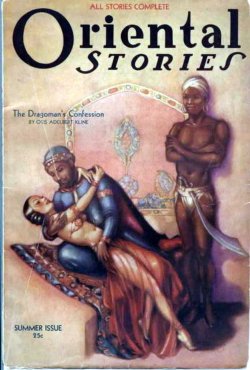[Pak Daily Times] The use of anti-Ahmadi rhetoric by political parties raises a serious question: Is there anyone who will ever stand up for their rights?
"It's almost laughable. You first forcefully declare us a minority, then you promise to protect minority rights, and when you fail, you conveniently say sorry," an Ahmadi that I interviewed recently for my elections research laughed at the contradiction and hopelessness in Pakistain. Behind his laugh, I could sense the pain and fear that has engulfed the minorities, especially the Ahmadis, in Pakistain. While the cities and media is buzzing with the slogans of 'Roshan' (bright) and 'Naya' (new) Pakistain, Ahmadis have been ambushed by political parties in their struggle for electoral seats. Politicians have gone the distance to prove themselves good Musselmens, the criterion of which in Pakistain is to believe in One God and the Prophet (PTUI!), and to also consider Ahmadis as 'kafir' (infidel). Political compulsion it might be for most of them, but for Ahmadis it is a sad reality check of the diminishing space to breathe in society. "How will these politicians take a stand for anything when they can't take a principled stand for the weak in society," an Ahmadi showed his distaste for the recent fiasco between the Pakistain Tehrik-e-Insaaf (PTI) and Jamaat-e-Ulema-e-Islam-Fazl (JUI-F) on the Ahmadi issue that got viral on the social media.
Ahmadis are scared that using their sect as a political tool for votes will lead the youth and the nation into hyper-radicalisation, and Ahmadis will become the natural target of frustration. "You know that the German Jews couldn't have predicted the coming of the Holocaust. It began with years of systematic social isolation, hatred, and conspiracies against them, and then Hitler came, and we saw what happened. I see Pakistain heading towards that for us." As unbelievable as this statement from one of the Ahmadis who participated in WWII on the side of the Allies appears, in the past few months, while the nation had been busy with elections, Ahmadis are being silently targeted, not only by religious Death Eaters, but by government itself in all the major cities, especially in Lahore under the interim setup of Chief Minister Najam Sethi. However,
a hangover is the wrath of grapes...
none of the atrocities are being reported as 'breaking news' on the mainstream media outlets.
"In the past two weeks our mosques have been raided by the police, our publication shops turned into a mess, and we have been barred and threatened by the police not to have any of our literature at our home, nor have any religious meetings in our centres." An Ahmadi in a position of authority who requested anonymity explained in frustration: "They have even told us that they have the list of all addresses of Ahmadis, and they will raid houses to confiscate any literature," which gave a glimpse of the Nazi-era style of discrimination against the Jews. "We are being systematically forced to leave this country, this land. More than Ahmadi, I'm a Punjabi and my family has lived on this land for centuries, and today I don't have an option but to leave." Tears rolled out of this old man, whose father was a wealthy businessman at the time of partition and sold all his possessions to give funds to the Pakistain Musselmen League. Today, he is being forced out of the land of his forefathers.
The discrimination does not stop here, as another tragic event took place a week before the elections in Gulshan-e-Ravi, Lahore, where the police raided an Ahmadi centre and tossed in the calaboose
Drop the gat, Rocky, or you're a dead 'un!
the people who were offering their prayers. On top of charging them under the Hudood law of 'imitating Musselmen practices', the men arrested were also accused of conspiring against the state and for terrorism. The arrested persons included an 83-year-old man, and a few minors. During the court proceedings, the High Court dismissed the case, calling it a politically motivated attempt by people in the area, but in a matter of hours, after severe pressure from right wingers, the judge refused to give bail to the detainees. According to the lawyer who is defending the Ahmadis, "No judge is willing to take a stand for Ahmadis against these right wing mullahs," who threaten the judges and get their way. One is forced to ask this simple question: on whose authority is all this being done, and why is the government so hopeless against these right wingers? Is it also equally involved?
I asked an Ahmadi for his opinion on this question to which he responded, "We are political suicide for any politician in Pakistain. Even a dictator like Musharraf who genuinely felt the pain for us, and during whose tenure, in spite of whatever was happening in Pakistain, minorities were protected and discriminated against less, could not reverse the constitutional discrimination against us. He had to bow down to the religious fanatics at last, the same way Zulfiqar Ali Bhutto gave in back in the 1970s."
When it comes to Ahmadis it is not just the illiterate class that hates and discriminates the community, even the educated and the affluent have little sympathy. While these elections might prove to be a positive tide for Pakistain, the use of anti-Ahmadi rhetoric by political parties raises a serious question, and a concern for millions of Ahmadis who live in Pakistain.
Is there anyone who will ever stand up for their rights?
| Not in Pakistan, no. It's too much fun to treat them as non-Muslims, and too dangerous not to. Only in America are the Ahmadis seen as Muslim as anyone else. |
|
 [DAWN] RAPE crimes remind us of both our failings as a society and the state's failure to appropriately exercise its executive and judicial functions to curb this crime of loathing and depravity. This article sheds light on the reasons for such a momentous failure which, predominantly, is the by-product of lack of education, the absence of awareness and ineffective law-enforcement mechanisms.
[DAWN] RAPE crimes remind us of both our failings as a society and the state's failure to appropriately exercise its executive and judicial functions to curb this crime of loathing and depravity. This article sheds light on the reasons for such a momentous failure which, predominantly, is the by-product of lack of education, the absence of awareness and ineffective law-enforcement mechanisms.
 [Dawn] There has been some talk of amending the Anti-Terrorism Act of 1997 (ATA) to make it more effective in its response to terrorism. It is therefore instructive to view the anti-terror mechanism envisaged by the ATA and see why, despite this law, terrorism has grown unchecked.
[Dawn] There has been some talk of amending the Anti-Terrorism Act of 1997 (ATA) to make it more effective in its response to terrorism. It is therefore instructive to view the anti-terror mechanism envisaged by the ATA and see why, despite this law, terrorism has grown unchecked. [Dawn] MONDAY'S decision by the Council of Islamic Ideology not to have DNA testing in rape cases as primary evidence, as suggested by some, would have come as a disappointment to those who had expectations to the contrary. Giving the council's final opinion on the matter, CII chairman Maulana Mohammad Khan Sherani told newsmen on Thursday that even though DNA testing was a useful and modern technique, a court could only take it into account along with other material as "supporting evidence". Evidently, the CII's reformist camp led by Maulana Tahir Ashrafi failed to convince the majority in the CII that the results of a DNA test could be the sole basis for convicting a person accused of rape. The CII chief also rejected the Women's Protection Act of 2006 and defended the blasphemy law by saying it should not be amended.
[Dawn] MONDAY'S decision by the Council of Islamic Ideology not to have DNA testing in rape cases as primary evidence, as suggested by some, would have come as a disappointment to those who had expectations to the contrary. Giving the council's final opinion on the matter, CII chairman Maulana Mohammad Khan Sherani told newsmen on Thursday that even though DNA testing was a useful and modern technique, a court could only take it into account along with other material as "supporting evidence". Evidently, the CII's reformist camp led by Maulana Tahir Ashrafi failed to convince the majority in the CII that the results of a DNA test could be the sole basis for convicting a person accused of rape. The CII chief also rejected the Women's Protection Act of 2006 and defended the blasphemy law by saying it should not be amended. [Dawn] The Council of Islamic Ideology (CII) on Monday decreed DNA tests unacceptable as primary evidence in rape cases, but said they could be considered as supporting evidence.
[Dawn] The Council of Islamic Ideology (CII) on Monday decreed DNA tests unacceptable as primary evidence in rape cases, but said they could be considered as supporting evidence. ...the creepy-looking former dictator of Pakistain. Zia was an Islamic nutball who imposed his nutballery on the rest of the country with the enthusiastic assistance of the nation's religious parties, which are populated by other nutballs. He was appointed Chief of Army Staff in 1976 by Prime Minister Zulfikar Ali Bhutto, whom he hanged when he seized power. His time in office was a period of repression, with hundreds of thousands of political rivals, minorities, and journalists executed or tortured, including senior general officers convicted in coup-d'état plots, who would normally be above the law. As part of his alliance with the religious parties, his government helped run the war against the Soviets in Afghanistan, providing safe havens, American equipiment, Saudi money, and Pak handlers to selected mujaheddin. Zia died along with several of his top generals and admirals and the then United States Ambassador to Pakistain Arnold Lewis Raphel when he was assassinated in a suspicious air crash near Bahawalpur in 1988...
...the creepy-looking former dictator of Pakistain. Zia was an Islamic nutball who imposed his nutballery on the rest of the country with the enthusiastic assistance of the nation's religious parties, which are populated by other nutballs. He was appointed Chief of Army Staff in 1976 by Prime Minister Zulfikar Ali Bhutto, whom he hanged when he seized power. His time in office was a period of repression, with hundreds of thousands of political rivals, minorities, and journalists executed or tortured, including senior general officers convicted in coup-d'état plots, who would normally be above the law. As part of his alliance with the religious parties, his government helped run the war against the Soviets in Afghanistan, providing safe havens, American equipiment, Saudi money, and Pak handlers to selected mujaheddin. Zia died along with several of his top generals and admirals and the then United States Ambassador to Pakistain Arnold Lewis Raphel when he was assassinated in a suspicious air crash near Bahawalpur in 1988...